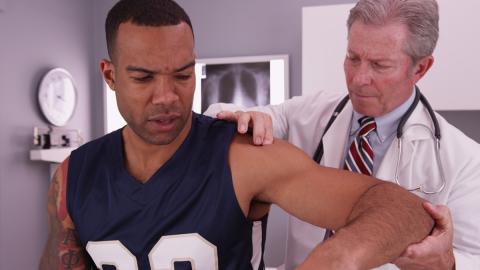Successful treatment of shoulder pain depends on having an accurate diagnosis so if your symptoms are not improving with simple exercises and adapting your activities then see your GP or physiotherapist for an assessment.

Some physiotherapy treatments such as massage, manual therapy, electrotherapy and acupuncture have very little value in treating shoulder pain and are not recommended.
When can you exercise with shoulder pain?
Shoulder instability is usually treated without surgery unless there is a significant injury that has damaged the shoulder joint. This is most common in young people after sporting injuries or after epileptic fits. It is important to try and restore normal movement and activity as soon as possible after a shoulder dislocation.
Exercises to strengthen the shoulder and improve balance reactions help to reduce the risk of repeated dislocations. The most commonly used exercise programme in the UK is the Derby Shoulder Instability Rehabilitation Programme on YouTube.
How painkillers and steroid injections can help you remain active
Subacromial shoulder pain is the most common cause especially in 30 to 70 year olds. Try to remain as active as possible, take painkillers if needed and do strengthening exercises to help your shoulder recover. The British Elbow and Shoulder Society has produced a useful guide for common causes of shoulder pain that you can follow.
Frozen shoulder typically affects people in their 50s. As it causes significant pain it is difficult to exercise without adequate pain relief. A steroid injection followed by gentle stretching and strengthening exercises is effective for the majority but sometimes keyhole surgery is offered if symptoms fail to respond.
Shoulder arthritis can often be well managed with a combination of lifestyle modification and exercise to maintain strength and flexibility. Painkillers and steroid injections can be useful during a flare-up. In severe cases surgery, such as a joint replacement, may be advised.


